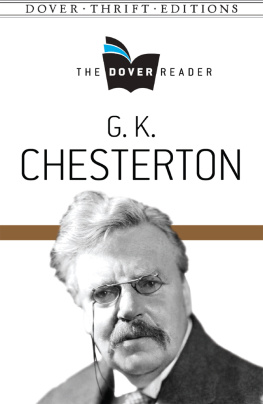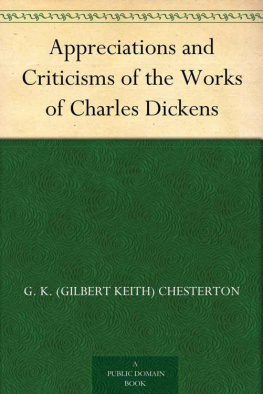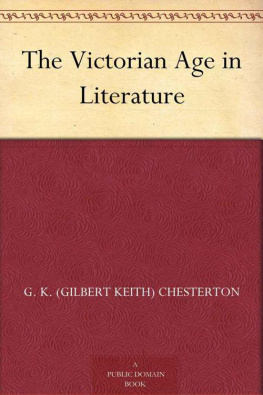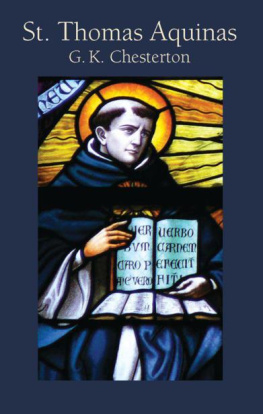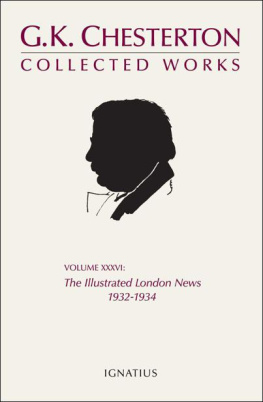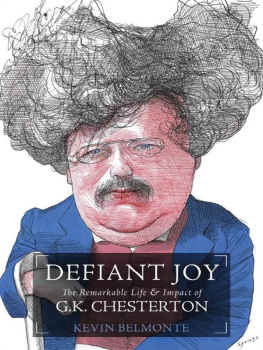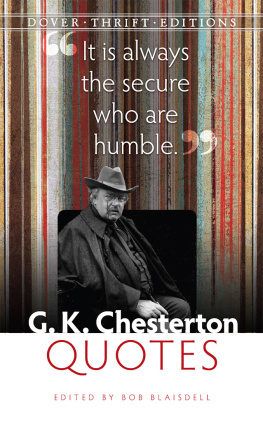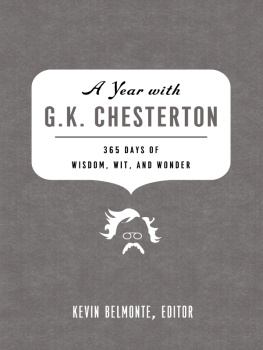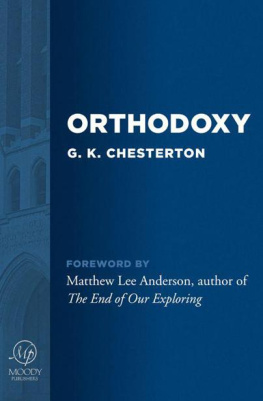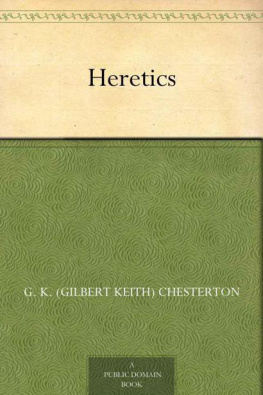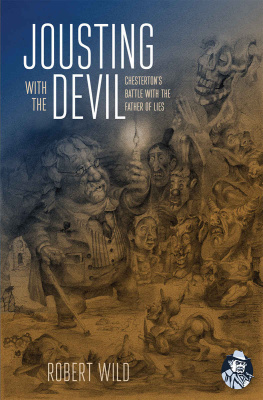
G. K. Chesterton

DOVER PUBLICATIONS, INC.
Mineola, New York
DOVER THRIFT EDITIONS
G ENERAL E DITOR : M ARY C AROLYN W ALDREP
E DITOR OF T HIS V OLUME : J IM M ILLER
Copyright
Copyright 2014 by Dover Publications, Inc.
All rights reserved.
Bibliographical Note
G. K. Chesterton: The Dover Reader, first published by Dover Publications, Inc., in 2014, is a new compilation of works by G. K. Chesterton, reprinted from authoritative sources. The Note has been specially prepared for this Dover edition.
International Standard Book Number
eISBN-13: 978-0-486-79994-0
Manufactured in the United States by Courier Corporation
79114901 2014
www.doverpublications.com
Note
G ILBERT KEITH CHESTERTON was born in London on May 29th, 1874, and before the turn of the century established himself as a free-lance journalist and reviewer. From the publication of his first book of poetry, The Wild Knight, until his death in 1936, Chesterton was one of the most prolific and best-known figures on the English literary scene. During those three and a half decades he turned out dozens of volumes of political and social commentary, literary criticism and biography, theological essays, poems, short stories, and novels. This collection contains a broad spectrum of Chestertons work, including The Man Who Was Thursday, perhaps his bestknown novel. It also includes six short stories featuring the priest-sleuth Father Brown, Orthodoxy, The Club of Queer Trades, and a selection of essays on a wide range of subjects. G. K. Chestertons literary output was so enormous and his subjects so varied that one can only hope to impart a little of the wit, humor, and intelligence that made him the Prince of Paradox.
Contents
Father Brown
Contents
THE BLUE CROSS
B ETWEEN THE silver ribbon of morning and the green glittering ribbon of sea, the boat touched Harwich and let loose a swarm of folk like flies, among whom the man we must follow was by no means conspicuousnor wished to be. There was nothing notable about him, except a slight contrast between the holiday gaiety of his clothes and the official gravity of his face. His clothes included a slight, pale grey jacket, a white waistcoat, and a silver straw hat with a grey-blue ribbon. His lean face was dark by contrast, and ended in a curt black beard that looked Spanish and suggested an Elizabethan ruff. He was smoking a cigarette with the seriousness of an idler. There was nothing about him to indicate the fact that the grey jacket covered a loaded revolver, that the white waistcoat covered a police card, or that the straw hat covered one of the most powerful intellects in Europe. For this was Valentin himself, the head of the Paris police and the most famous investigator of the world; and he was coming from Brussels to London to make the greatest arrest of the century.
Flambeau was in England. The police of three countries had tracked the great criminal at last from Ghent to Brussels, from Brussels to the Hook of Holland; and it was conjectured that he would take some advantage of the unfamiliarity and confusion of the Eucharistic Congress, then taking place in London. Probably he would travel as some minor clerk or secretary connected with it; but, of course, Valentin could not be certain; nobody could be certain about Flambeau.
It is many years now since this colossus of crime suddenly ceased keeping the world in a turmoil; and when he ceased, as they said after the death of Roland, there was a great quiet upon the earth. But in his best days (I mean, of course, his worst) Flambeau was a figure as statuesque and international as the Kaiser. Almost every morning the daily paper announced that he had escaped the consequences of one extraordinary crime by committing another. He was a Gascon of gigantic stature and bodily daring; and the wildest tales were told of his outbursts of athletic humour; how he turned the juge dinstruction upside down and stood him on his head, to clear his mind; how he ran down the Rue de Rivoli with a policeman under each arm. It is due to him to say that his fantastic physical strength was generally employed in such bloodless though undignified scenes; his real crimes were chiefly those of ingenious and wholesale robbery. But each of his thefts was almost a new sin, and would make a story by itself. It was he who ran the great Tyrolean Dairy Company in London, with no dairies, no cows, no carts, no milk, but with some thousand subscribers. These he served by the simple operation of moving the little milk-cans outside peoples doors to the doors of his own customers. It was he who had kept up an unaccountable and close correspondence with a young lady whose whole letter-bag was intercepted, by the extraordinary trick of photographing his messages infinitesimally small upon the slides of a microscope. A sweeping simplicity, however, marked many of his experiments. It is said he once repainted all the numbers in a street in the dead of night merely to divert one traveller into a trap. It is quite certain that he invented a portable pillar-box, which he put up at corners in quiet suburbs on the chance of strangers dropping postal orders into it. Lastly he was known to be a startling acrobat; despite his huge figure, he could leap like a grasshopper and melt into the treetops like a monkey. Hence the great Valentin, when he set out to find Flambeau, was perfectly well aware that his adventures would not end when he had found him.
But how was he to find him? On this the great Valentins ideas were still in process of settlement.
There was one thing which Flambeau, with all his dexterity of disguise, could not cover, and that was his singular height. If Valentins quick eye had caught a tall apple-woman, a tall grenadier, or even a tolerably tall duchess, he might have arrested them on the spot. But all along his train there was nobody that could be a disguised Flambeau, any more than a cat could be a disguised giraffe. About the people on the boat he had already satisfied himself; and the people picked up at Harwich or on the journey limited themselves with certainty to six. There was a short railway official travelling up to the terminus, three fairly short market-gardeners picked up two stations afterwards, one very short widow lady going up from a small Essex town, and a very short Roman Catholic priest going up from a small Essex village. When it came to the last case, Valentin gave it up and almost laughed. The little priest was so much the essence of those Eastern flats: he had a face as round and dull as a Norfolk dumpling; he had eyes as empty as the North Sea; he had several brown-paper parcels which he was quite incapable of collecting. The Eucharistic Congress had doubtless sucked out of their local stagnation many such creatures, blind and helpless, like moles disinterred. Valentin was a sceptic in the severe style of France, and could have no love for priests. But he could have pity for them, and this one might have provoked pity in anybody. He had a large, shabby umbrella, which constantly fell on the floor. He did not seem to know which was the right end of his return ticket. He explained with a moon-calf simplicity to everybody in the carriage that he had to be careful, because he had something made of real silver with blue stones in one of his brown-paper parcels. His quaint blending of Essex flatness with saintly simplicity continuously amused the Frenchman till the priest arrived (somehow) at Stratford with all his parcels, and came back for his umbrella. When he did the last, Valentin even had the good nature to warn him not to take care of the silver by telling everybody about it. But to whomever he talked, Valentin kept his eye open for someone else; he looked out steadily for anyone, rich or poor, male or female, who was well up to six feet; for Flambeau was four inches above it.
Next page
